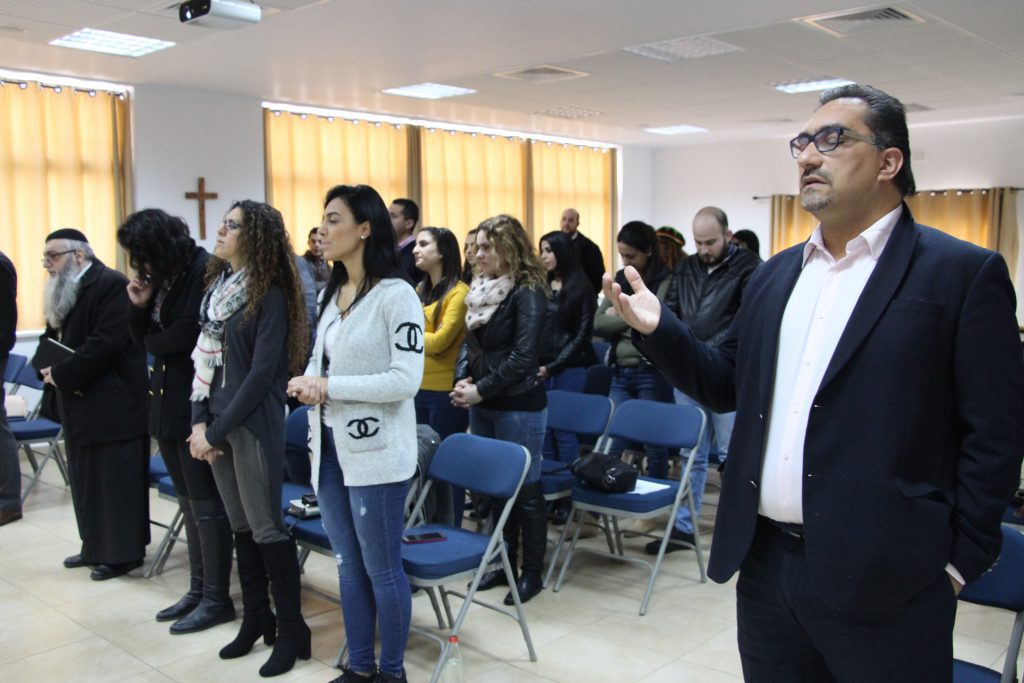
TO MAKE A BRIDGE

TO MAKE A BRIDGE
By Lynne McCarthy
Let me tell you something wonderful.
At this very moment, someone (we don’t know who) somewhere (we don’t know where) is praying for us. Perhaps this person is praying for an individual, perhaps for the entire community of students, staff and faculty at the College. That unknown someone is asking God to meet our needs, to bless us, to comfort us, and to be with us in our joys and sorrows.
If someone stands as a bridge between us and God, asking for help or grace or health or comfort on our behalf, we call this intercession. We have many examples of intercession; here are just a few.
In Gen. 18:16-33, God, angered at the sins of the people of Sodom, plans to wipe out this evil city. But Abraham stands before God, begging Him not to destroy it if he is able to find 50 righteous people. (For if 50 are found, God would not destroy it.) Abraham tries again. 40? (Not for 40.) And so on, down to 10, and still no, God will not destroy it even for the sake of 10 righteous people. God’s response to Abraham is measured but sure, and finally He acts. In Chapter 19, Lot and his family are rescued by an angel of the Lord before fire falls and destruction is complete.
Intercession for others often means coming again and again to God to ask, not because God is deaf or uncaring, but because we need to do this, to never give up asking, in faith, for His response. We see this in the parable of the unjust judge, in Luke 18:1-8. Sometimes, we just have to pester God until we get an answer.
We also intercede in response to another’s request for prayer. In the Old Testament, the most unlikely person to ask for prayer was Pharaoh! His motives were mixed, as the plague of flies at that moment was too much, and he just wanted it to stop. In Ex. 8:28, after a stern warning to Moses about not running away, he says, “… Now pray for me.” Moses did pray, and God answered. The flies stopped. But Pharaoh didn’t, and we are told he kept hardening his heart, even after asking for prayer in later plagues. Moses prayed; God heard and answered.
The priests of the Old Testament were the intercessors of the time, the high priest coming into the Holy of Holies once a year to offer sacrifices for the sins of the people. But when Jesus came, He became the sacrifice, even of His eternal relationship with the Father. In John 17, we read the prayer of Jesus as High Priest, praying for His disciples and us. Verse 15 is particularly powerful: “My prayer is not that you take them out of the world but that you protect them from the evil one.” Jesus also prays for our unity, to remain one in Him as He is one with His Father.
Even in dying on the cross, in great pain and agony, He prayed for His enemies. We read in Luke 23:34, “Father forgive them, for they do not know what they are doing.” Jesus is truly our High Priest who intercedes for us, and we note in that wonderful verse in Hebrews 7:25: “Therefore He is able to save completely those who come to God through Him, because He always lives to intercede for them.” Jesus prays for us!
But we also pray for each other. Paul’s letters are full of his requests to God for believers. Look at Eph 3:14-21; look at the opening greetings in his letters; look at Phil. 1:3-6, “… in all my prayers for you…” he expresses his faith that his prayers will be heard and answered powerfully.
We pray for healing leading to forgiveness. James urges us in chapter 5:16 to “…confess your sins to one another and pray for each other so that you may be healed. The prayer of a righteous man is powerful and effective.” We must believe that God answers. We must ask in faith that He hears our prayers and in His surprising ways will give us what we need. Not what we want, necessarily, but what we need.
In Phil, 4:6, Paul gives us a kind of template for intercession: “… by prayer and petition, with thanksgiving, present your requests to God.” The result is not only an answer, but a deep, protective peace that is beyond what we can understand.
But if we don’t know what or how to pray, Romans 8:26-27 tells us that the Holy Spirit prays for us more deeply and intensely than we ever could. He “groans” on our behalf, powerful wordless prayer that has God’s ear. So, we come again to Heb. 7:25, for Jesus lives to pray for us, joining His prayers to the Spirit’s.
It is our responsibility, privilege and joy to lift others up to the Father in the name of the Lord Jesus, interceding for them, knowing He listens out of His deep love as we pray alone or together. He, in turn, gives us His “peace that passes understanding” as we come to Him, praying for those we know and love, and for those we don’t know or love.
Someone at this very moment is praying for us. We can rely on Jesus for that. We can count on His Spirit to groan deeply when sorrow or despair or depression or any kind of suffering makes us unable to pray. And we pray for each other, believing that our prayers are heard before we even ask, in ways that are so much greater than we can ask or imagine.
BethBC’s students are taking intercession so seriously! At the end of each month, the students gather together for a prayer day. They worship, and pray for each other’s needs, they intercede for each other, they share their needs and prayer requests and someone else prays for their brother or sister in Christ. It is something wonderful to know that we can pray for one another, that we can stand with each other in sorrow and pain and stand in the gap for each other! It is something wonderful, indeed.


